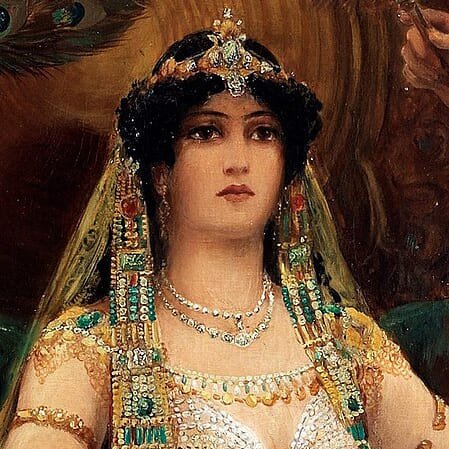The queen of Sheba is a legend full of intrigue, wisdom, and an ethereal meeting with King Solomon that has captured generations. And yet, after all those wild tales of her life, amazingly, we know pretty much next to nothing about her death. Whatever happened to this enigmatic queen? Did she slowly fade into obscurity, or are there ancient clues hinting toward her final years? Now dear reader, come with me as I peep at the death mystery of Queen Sheba through historical texts, religious scriptures, and cultural legends.
Who Was the Queen of Sheba?
First, one must start off with a tribute to the Queen of Sheba in all religious and cultural diversities. Ranging from the Ethiopian folklore, where she is known as Makeda, to the Islamic tradition named Bilqis, the most well-known account about the Queen of Sheba is found in the Hebrew Bible in 1 Kings 10 and 2 Chronicles 9. It is the story of a powerful queen who visited Jerusalem to challenge the wisdom of the highly publicized King Solomon. In that brief biblical apparition, she leaves a mark of being an intelligent, rich, and wise ruler. A Brief Biblical Encounter made her an Eternal Figure!
In the biblical texts, the Queen of Sheba comes with gifts and challenging questions for Solomon. Her visit is not just a question of diplomacy; rather, it’s the magnificent encounter in which wisdom, faith, and the human desire to know the truth meet. When finally Solomon answers all of her questions, the queen notices not only his wisdom but also that of God and therefore begins to praise the God of Israel. The Queen’s interaction with Solomon insinuates her openness to divine revelation, hence making her a very unique figure who ties together wisdom and faith.
This Phenomenal woman’s story expands and proliferates beyond what is recorded within the Hebrew Bible. However, in the Quranic account, as found in Islamic literature, it is Bilqis, a queen who had a conversation with King Solomon and came to acknowledge God’s sovereignty. The Quranic narrative brings into focus submission to God and a balance between wisdom and humiliation. Islamic sources would fill in much of her life and career, reflecting upon her rule as well as her conversion through the divine knowledge; and some have therefore questioned whether this was not a sort of spiritual “death” to her old self. In the Ethiopian Kebra Nagast, a national epic and foundational religion the Queen of Sheba is named Makeda and takes center stage even more.
This account tells of her as the mother of Menelik I, Solomon’s son, who is considered to be the founder of the Ethiopian Solomonic dynasty. According to Ethiopian tradition, she returned to her land with Solomon’s child, meaning her legacy continued through Menelik and the line of Ethiopian kings. The text presents her life and death as closely connected with God’s work, which she had to fulfill, making her part of the Messiah’s genealogy and a prophetic vocation.
Queen of Sheba’s Death Mystery:

The Bible’s Silence on Her Death
The biblical record remembers the Queen of Sheba as a visitor to Solomon who tested his wisdom and bestowed great wealth upon Israel’s king. But curiously, she is never again mentioned after her departure. There is no word of her eventual death nor what she did following her return to Sheba. The fact that she does not die according to the Bible has made many scholars and theologians speculate about what her end was; therefore, many theories have been thrown out there.
Because she disappears from the biblical text, some have offered the belief that she must have spent her remaining years back in her native land, ruling over her people. Still, others believe she may have merely mixed the ideology with Israel and brought monotheism to Sheba. These, however, are baseless speculations since no scripture has confirmed them.
Queen of Sheba’s Death in other Ancient Texts
Curiously, while the Bible is silent, other ancient traditions have some interesting conjecture on her demise. One of the most prominent is the Ethiopian Kebra Nagast, which gives a full narrative account of her dealings with Solomon and then her return to Sheba. In this account, she gave birth to a son to Solomon named Menelik, who subsequently became the first king of Ethiopia. The Kebra Nagast celebrates her legacy, however, through her children, not her death, and therefore seems to indicate that she died of old age after seeing her son’s enthronement. This point of view was of importance in Ethiopian history, where she was considered the matriarch of the Solomonic dynasty.
Islamic folklore, on the other hand, looks at her latter life in another direction. Some of the Islamic traditions go to the extent of stating that she married Solomon and lived with him until she died. Other versions have it that she returned to her land, and ruled over them till her death, though the details of her death are relatively vague. The Islamic versions of her later years make her legend more romantic by presenting her as the woman who might have found love and unity in Solomon’s kingdom. But even these accounts do not carry explicit details about how or when she died.
Legends of Different Cultures and Theories Over Her Death:
Different cultural stories also try to fill in the lacuna of her account, each adding their own interpretation to it. In Ethiopian tradition, she is celebrated as a sort of saintly figure who brought home to her people the wisdom of Solomon. Other variants of legends claimed she lived to a ripe old age, her death considered peaceful, even divinely blessed. There are even Ethiopian churches and shrines in memory of her; this underlines the same notion of her revered status, and that her end was seen as noble, hence blessed.
The Yemeni folklore, from where some scholars are placing Sheba, claims she died in her palace surrounded by all riches and comfort. In many of the Yemenite tales, she sometimes comes out as an intimidating but respected ruler, so her death was to end an era of prosperity and wisdom. Whereas there are many Yemeni accounts where she does not die, so much as in the course of her dying, a way of alluding to aspects of her influence and legacy – an inference perhaps that culturally, there was a decided emphasis on her reign rather than on her mortality.
My Insights and Analysis: Why So Little is Known
One of the reasons she died in obscurity: ancient cultures were more often concerned with the legacy left by the ruler rather than the actual death of it. With her legendarily wise and genius-like diplomatic mind, it would be quite suiting that she was remembered rather for her life and not its end. Besides, any further shortage of records of her death might be accounted for by the fact that in the cultural traditions of her symbolic significance, historical evidence is far less important.
Another consideration is that Sheba was a matrilineal society, and the death of a queen would not dislocate the line of succession as violently as it might have done in patrilineal societies. She thus would have required little in the way of documentation or commemoration, all the more so given how effortlessly her son Menelik succeeded her mantle. That fact, coupled with an absolute lack of anything even close to archaeological evidence, would have left her end to interpretations.
Theories of How She Could Have Died?

From these few cultural and historic sources, some theories are forwarded concerning how the Queen of Sheba might have died:
- Natural Causes in Her Homeland: The most obvious explanation would be that she died of natural causes, perhaps in her homeland. Being a great ruler, she would have lived a long and prosperous life, dying peacefully after securing the future of her dynasty.
- As a Martyr or Symbolic Figure: Some of the legends speak to the notion that she might have died as a symbol of divine favor or judgment. In this light, her death could have been a religious or symbolic marker of the end of an era, ushering in another under her son’s rule.
- Married to Solomon and Dying in Israel: That she married Solomon and died in his kingdom is a theory that finds traction in some Islamic traditions. In the absence of any hard proof, this is the type of narrative that plays well with people who envision their union as a bridge between two great civilizations.
- Celebrated as a Holy Soul in Ethiopian Tradition: Her death to Ethiopian Christianity was not merely an end to mortality, but an ascension to the highest pinnacle of sainthood. From such a viewpoint, it exalts her into a spiritual realm of life beyond the terrestrial death and into the realms of veneration.
The Kaleidoscope of Traditions Surrounding Her Legacy and Her ‘Symbolic’ Death:

While from a biblical perspective, nothing says anything about her death; however other traditions indeed have her return to her country and reign for many years, her memory remaining as a just and equitable queen. In Ethiopian tradition, her legacy flows through the line of her descendants, carrying the Ark of the Covenant at Axum. It speaks not to her physical death but to a spiritual continuity, a legacy that endures. Even the Islamic sources are mostly silent about her death, though they present her turning to the worship of God as a radical change, symbolically a “death” to old ways and rebirth in faith. The idea here reflects the common concept of spiritual rebirth across many religions, whereby conversion is likened to dying to self or previous belief and acceptance of new life.
Without clear historical records to indicate precisely what occurred in her later years, understandings of the Queen of Sheba are very much left to her portrayal in religious texts, cultural lore, and themes associated with her story. This fact has brought forth at least a few interesting hypotheses. Each of these hypotheses discusses how Solomon’s encounter with her, building her faith, and ways her life might have changed in the later years. Some major hypotheses forwarded by scholars and traditions are discussed below:
1. Reign Continues with Wisdom and Humility Endowed Anew
Some scholars say that, when she returned to her kingdom, the Queen of Sheba was almost a different woman. This meeting with Solomon probably gave her more than wisdom, or rather a more profound ability to understand how one reigned through service and humility. The Bible relates that she was astonished with Solomon’s wisdom and the God he served-a reaction which, in most probability, got affected by her method of governance upon her return. Here, her “death” may connote a death of self-that transformation from being a queen of material wealth and power into one who values spiritual perception and compassion, virtues so highly extolled by biblical accounts.
2. Symbolic “Death” and Spiritual Rebirth
In some Islamic interpretation and Ethiopian folklore, this meeting with Solomon is a form of spiritual rebirth. The Quran in the Surah An-Naml, 27:20-44, presents her story as one of submission before God. Following the meeting with Solomon, she is reported to have submitted herself before Allah’s might, killed her old ways and beliefs, so to say. This is a sort of symbolic death, actually rather common in most religious traditions, where the change via personal transformation is described as “dying” to one’s old self and being “reborn” in faith. The consequence of such spiritual rebirth may be that her later years were suffused with deep devotion to faith and altered fundamentally her approach to both leadership and personal life.
3. Theory about Marriage Alliance
Another hypothesis, though, states that this relationship between her and Solomon could amount to more than sharing wisdom, growing into a political or marital alliance. Indeed, some accounts go so far as to say she had a son by Solomon, Menelik I, who became the first emperor of Ethiopia. In that case, there would be a continuing link between her and the kingdom of Solomon. Were this to be so, it would have ensured her legacy through her offspring, affecting not only her private life but the religious and political fabric of her nation. That said, such a marriage alliance would give meaning to her later years and carry implications in terms of legacy-stretching for future generations.
4. Pilgrimage and Religious Pilgrimage
Her trip to Solomon can be described, according to some traditions, as a pilgrimage-one taken for the express purpose of seeking truth and enlightenment. According to this interpretation, this visit by the Queen of Sheba may have been a spiritual epiphany in her life, and going back to her own land, she would like to find out more spiritual truths. Her voyage to Jerusalem signifies the end of the worldly queen and the birth of a queen seeking knowledge of God. Such a hypothesis does agree with accounts from the Kebra Nagast, where she describes her adherence to the teachings received from Solomon. That would mean she lived in righteousness in her later life, probably continued going on pilgrimages, or at least in spiritual disciplines in which her faith conversion to the Jewish faith had inspired.
5. Legacy of a Matriarchal Dynasty
Ethiopian legend has it that the Queen of Sheba was the matriarch of a Solomonic dynasty, beginning with her son Menelik I, and flowing well into modern times. It would therefore appear to suggest that she lived out her latter years as a respected figure, presiding over her kingdom with the insight and comprehension she derived from her contact with Solomon. Her “death” is not to be regarded as literal but the passing of an era of rulership into the hands of another lineage. She would have been celebrated as a matriarch, standing for wisdom, leadership, and spiritual insight that she gave out to her descendants. This is what continued in Ethiopia, in regard to her as a mother figure; thus, her life symbolized the bridge between earthly authority and divine purpose.
The incomplete jigsaw puzzle comprising scattered historical, religious, and cultural records bears witness to the account of the Queen of Sheba’s death. No sure conclusion seems to appear from these various ways of engagement, but they allow for a tapestry of possibility to be opened, with each shading light on her influence through different traditions. Because it is a story predicated upon wisdom and power, mystery set in. Hers is a timeless one, a continuing source of fascination and admiration that speaks volumes to this great queen’s legend.
Jaype Bester is a respected Pastor, author, and counselor based in Kriel, South Africa. Holding a diploma in Psychology and a Master of Divinity (Mh.D Divinity), he currently serves as the Presidential Pastor at Shakeid Ministries. Jaype has authored four books, including The Heart of a Psalmist: David and 365 Prophetic Guns For Men. He is passionate about empowering others through personal coaching and spiritual guidance.



